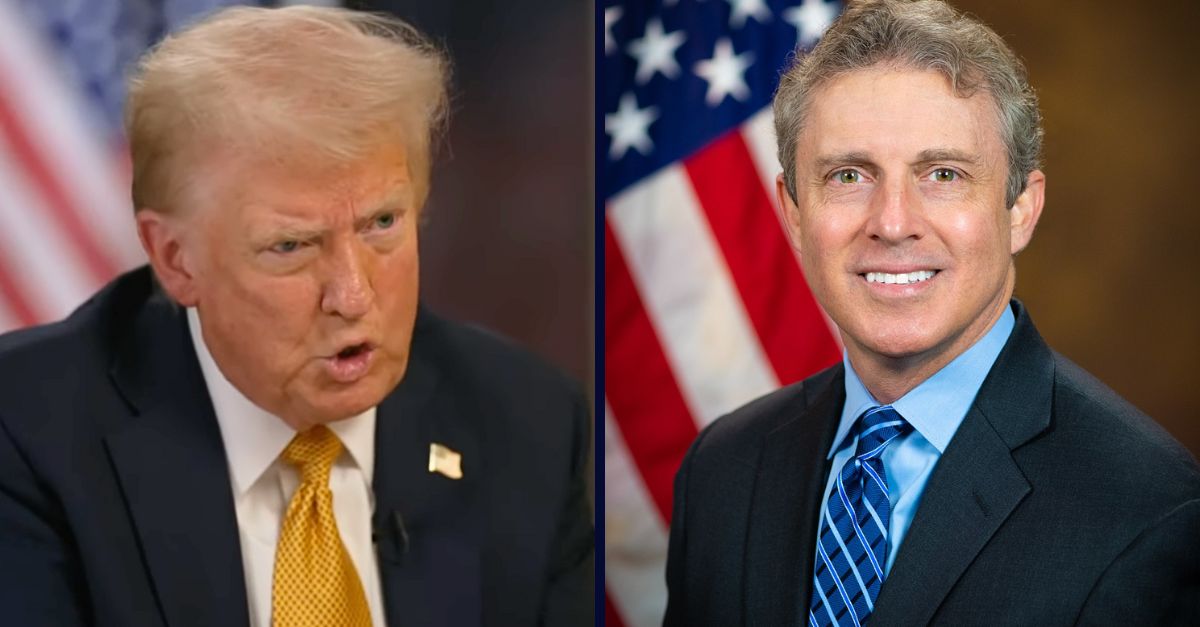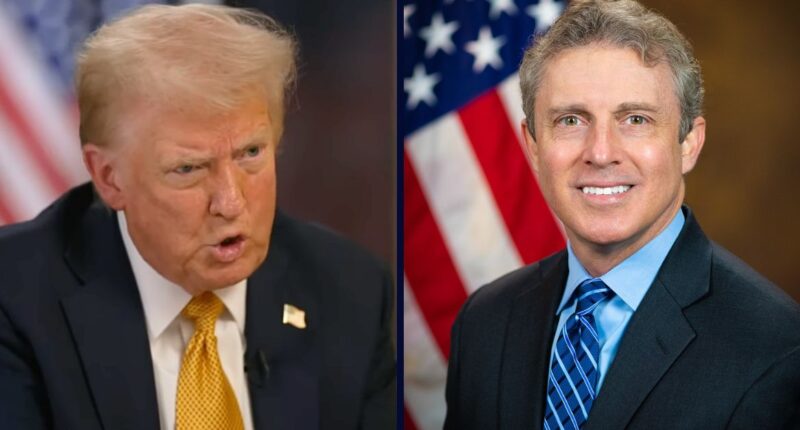
Left: President-elect Donald Trump on “Meet the Press” Sunday, Dec. 8, 2024 (NBC News/YouTube). Right: Hampton Dellinger (Office of Special Counsel).
Hampton Dellinger, the ethics enforcer for Biden, responded to President Donald Trump’s request to the U.S. Supreme Court to remove him from his position at the Office of Special Counsel. He criticized Trump’s efforts, calling them “uniquely weak” and stating that the claims had “no merit” after Trump’s administration faced setbacks from multiple judges earlier this month.
In a 42-page opposition filing, Dellinger’s lawyers argued against the government’s attempt to intertwine jurisdictional and merits inquiries as a basis for appellate jurisdiction, emphasizing that such a move would set a problematic precedent for similar cases in the future. They urged the Court to dismiss this maneuver, which could lead to an influx of urgent appeals like the one in this instance.
Trump’s Justice Department urged the Supreme Court to approve his repeated endeavors to dismiss Dellinger, asserting that court rulings against his termination have had a detrimental impact on the presidency. They claimed that these rulings restrict Trump’s ability to effectively lead the Executive Branch during his early days in office, thereby causing irreparable harm to his administration.
The Supreme Court application marked Trump’s first appeal to the country’s highest court since he took office in January — kicking off a string of multiple firings at his hands, which have sparked lawsuits and judicial showdowns. It came after the U.S. Court of Appeals for the District of Columbia Circuit rejected an attempt by the DOJ on Saturday night to green-light Dellinger’s axing, voting 2-1 to let him keep his job through a temporary restraining order (TRO) issued by a lower court judge last week.
In their opposition filing, Dellinger’s lawyers ripped Trump’s SCOTUS bid as being premature and lacking legal standards. They said moves such as these are “one reason why courts are so reluctant to authorize appeals of TROs, and it reflects the adverse consequences of the government’s shoot-the-moon tactics,” per the filing.
“We address each of these points for the sake of completeness, subject to the caveat that this case is just eight days old and both the parties and the lower courts are still grappling with the issues (as evidenced, in part, by the government’s presentation of arguments here that it barely developed — and that no court addressed),” wrote Dellinger’s lawyers. “In any event, the government’s case for carving out a jurisdictional exception here is uniquely weak.”
Last week, the Justice Department filed motions for an “immediate administrative stay” of the lower court’s TRO in both district and appeals court after it was granted by U.S. District Judge Amy Berman Jackson to allow Dellinger to keep his job while she weighs whether his firing by Trump on Feb. 7 was legal. The move came after Dellinger, who was appointed by Biden in February 2024 to enforce whistleblower laws, filed a lawsuit in the District of Columbia after being fired by the Trump administration “in a one-sentence email,” according to his federal complaint.
In its appeals motion, the DOJ pointed to Supreme Court precedent as well as former President Joe Biden’s own 2021 firing of Andrew Saul, who was social security commissioner at the time, as reasons for severing down the lifeline Jackson tossed to Dellinger last week.
More from Law&Crime: ‘Precisely the Executive abuses that the Appointments Clause seeks to prevent’: Judge troubled by Trump giving Musk ‘unchecked’ power, but won’t stop him — yet
“This case involves an unprecedented assault on the separation of powers that warrants immediate relief,” the DOJ’s SCOTUS application says.
Dellinger laid out multiple reasons Tuesday for why he feels Trump’s SCOTUS appeal should be tossed. First, his legal team noted how “no injunctive relief has been ordered against the president,” so the case does not “evoke the special solicitude sometimes afforded to that office,” contrary to the government’s assertions. “Second, the government has conceded here that it violated a directly applicable statute which no federal court has enjoined — and we are unaware of any case where this Court has granted emergency relief (let alone from an ordinarily unappealable TRO) so that the government can continue to violate a federal statute,” according to Dellinger’s lawyers.
They said this is “precisely the kind of circumstance” in which a TRO that preserves the status quo ante is “properly entered” while the parties brief and the courts evaluate the merits of the constitutional questions being presented in Dellinger’s case.
“Third, the government seeks such an extraordinary intervention despite genuine disputes over open legal issues (some of which it failed to develop below ) — and despite failing to identify any concrete, irreversible harm from maintenance of the TRO over the next eight days,” the opposition filing said.
Dellinger’s lawyers also pointed to the fact that the government has not identified “any reason to doubt that the district court is proceeding swiftly and ably” with his case.
“In fact, the district court has set a highly expedited schedule to resolve the merits, and may well decide the case in ways that avoid any need for this Court’s intervention (or at least create a proper record for it),” Dellinger’s team said.
“At bottom, there is no merit to the government’s effort to declare a five-alarm fire based on a short-lived TRO that preserves the status quo ante as prescribed by a half-century-old statute. Courts regularly deny stays pending appeal based on similar claims of injury to abstract Article II interests, and there is certainly no good reason to treat this circumstance as an exception to the general rule against appealing TROs.”
Trump’s DOJ and Dellinger are due in district court on Feb. 26 for their preliminary injunction hearing.









